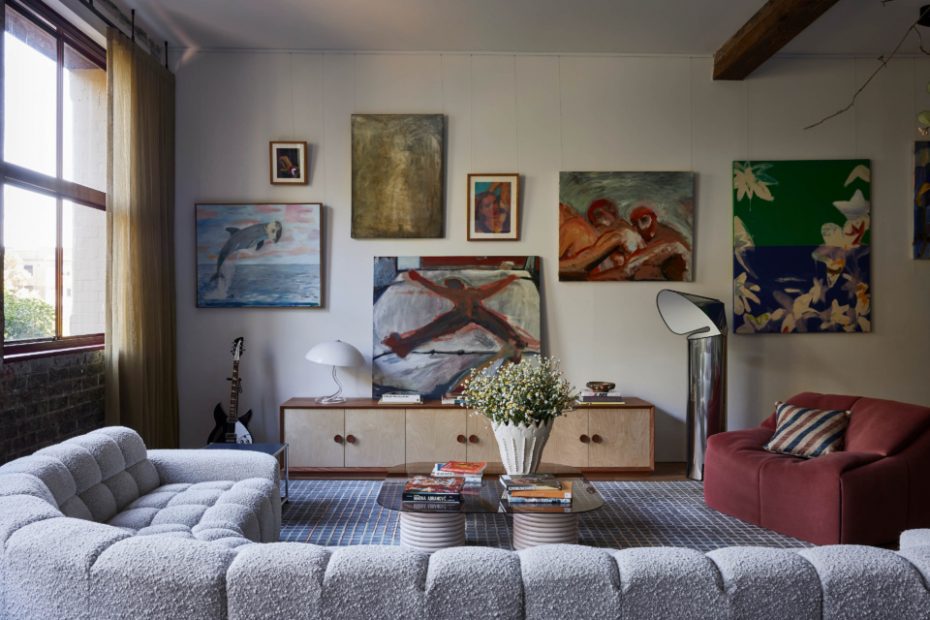An Artful Renovation In Sydney’s First Warehouse Conversion
Interiors
Two tone timber veneer sideboard designed by Studio Noakes. Plumy Armchair by Ligne Roset from DOMO. Floyd Coffee Table by Jardan. Rug by Tapetti. Chiara Floor Lamp by Flos from Eurolace. Artworks by Nick Collerson, Oscar Sulich, Madison Scott, and Luca Blasonato.
Two tone timber veneer sideboard designed by Studio Noakes. Plumy Armchair by Ligne Roset from DOMO. Floyd Coffee Table by Jardan. Rug by Tapetti. Chiara Floor Lamp by Flos from Eurolace. Artworks by Madison Scott and Luca Blasonato.
Floyd Coffee Table by Jardan. Rug by Tapetti.
Two tone timber veneer sideboard designed by Studio Noakes. Floyd Coffee Table by Jardan. Rug by Tapetti. Artworks by Nick Collerson and Oscar Sulich.
Vintage Featherston Scape dining chairs recovered in blue leather. Dining table designed by Studio Noakes using rosso orobico marble and gloss polyurethane legs. Fly Pendant by Kartell. Vintage. Artworks by Thomas Kusturin, Luca Blasonato, and Madison Scott.
Vintage Featherston Scape dining chairs recovered in blue leather. Dining table designed by Studio Noakes using rosso orobico marble and gloss polyurethane legs. Fly Pendant by Kartell. Artworks by Thomas Kusturin and Madison Scott.
Vintage Persian rug from Cadrys. Vintage Featherston Scape dining chairs recovered in blue leather. Dining table designed by Studio Noakes using rosso orobico marble and gloss polyurethane legs. Fly Pendant by Kartell. Artworks by Thomas Kusturin and Madison Scott.
Vintage Persian rug from Cadrys. Reeno Occasional Chair & Footstool from Grazia & Co.
Artworks by Thomas Kusturin and Oscar Sulich. Reeno Occasional Chair & Footstool from Grazia & Co.
Charles Ghost Stools from Kartell. Dulux Oxford Half paint. Tabata Wall Light by &Tradition. Gaetano Pesce vase. Reeno Occasional Chair & Footstool from Grazia & Co.
Tabata Wall Light by &Tradition.
Charles Ghost Stools from Kartell. Dulux Oxford Half paint. Tabata Wall Light by &Tradition. Gaetano Pesce vase.
Bedhead from Create Estate and covered in Catherine Mokum Bespoke Velvet in Sable. Vernier Round Burl Side Table by Rachel Donath. Flowerpot VP8 Wall Light by &Tradition. Quilted bed cover from In Bed. Throw blanket by Hale Mercantile Co from Maison Et Jardin.
Bedhead from Create Estate and covered in Catherine Mokum Bespoke Velvet in Sable. Vernier Round Burl Side Table by Rachel Donath. Flowerpot VP8 Wall Light by &Tradition. Quilted bed cover from In Bed. Throw blanket by Hale Mercantile Co from Maison Et Jardin. Kolonn Vase from Great Dane Furniture.
Eyeshine Circular Mirror by Gebruder Thonet Vienna. Vixel mosaic wall tiles.
Spotted gum timber veneer joinery.
Blush micro cement walls and rosso levanto marble.
Originally a shoe factory, The Watertower was first constructed in 1903.
The Redfern building became a converted warehouse development in 1984 after years of designing by architect Peter Mulroney.
Principal of Studio Noakes Genine Noakes always loved the original architecture of The Watertower — just not the previous updates made to her client’s apartment in the building.
Originally a shoe factory, the Redfern building was first constructed in 1903, and became a converted warehouse development in 1984 after years of designing by architect Peter Mulroney.
It was this history that the apartment owner and Genine were attracted to, but which had had been obscured by unsympathetic updates — think a black painted ceiling, black bathroom, red powder room, and red carpet.
Studio Noakes’ job was to reinstate the apartment’s character while injecting colour, art, and personality reflective of the owner’s taste.
To reveal the apartment’s bones, the internal brick walls were acid washed, and a dark mahogany stain was sanded off the floors, columns, and rafters to reveal the original blackbutt timber.
Inspiration for the new interior palette came from the client’s extensive art collection, and references combining the ‘simple and functional elements of mid-century design’, the more ‘eccentric and futuristic elements of the 70s and 80s’, and the vibe of New York loft warehouses.
Central to the apartment is the new kitchen, punctuated by the playful lightness of Dulux Oxford Half and elevated tempest quartzite.
Exposed clay bricks inspired a moodier scheme in the bedrooms and bathrooms, that showcase rosso levanto and rosso orobico marbles, with spotted gum timber joinery.
Subtle texture is also introduced through Venetian plaster on the main bedroom wall, and blush micro cement in the main bathroom.
Throughout the apartment, spaces are layered with books, art, and a combination of textured contemporary and classic furniture pieces. These items are a nod to the apartment’s industrial and residential past, and its future as a stylish and artful home.
Once a dark home that had lost its way, this apartment is now a warm and wonderful abode that is simultaneously unique to the owner, and faithful to the building’s origins.
